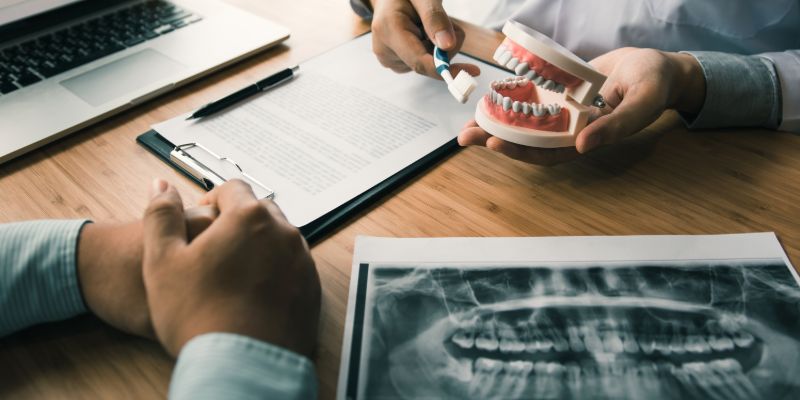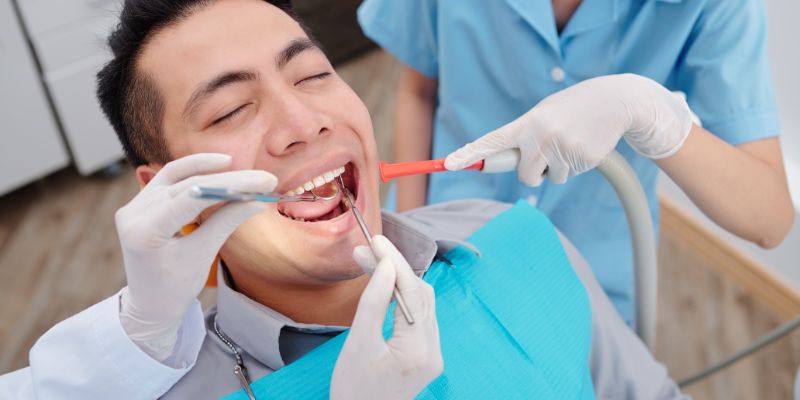Prevention Is the First Line of Defense
Routine preventive dentistry is the best way to protect your teeth from cavities, tooth decay, and a host of other problems. At John Leitner DDS, our team is dedicated to preserving the longevity of your smile. We can help keep you on the right path to helping you reach optimal dental wellness through our preventive dental services.


Preventive care can make a significant difference in protecting you from more serious issues. Preventive dental exams benefit your oral health by:
- Lowering the risk of developing cavities, tooth decay, and gum disease
- Promoting healthy oral hygiene habits at home
- Teaching you how to better care for your oral health
- Identifying oral cancer and dental problems early on so they can be treated quickly and more effectively
- Reducing dental problems associated with chronic medical conditions such as eating disorders, diabetes, and osteoporosis
What Is Preventive Dentistry?
Preventive dentistry aims to help patients maintain the best possible oral health. The combination of regular dental appointments and consistent at-home habits can help prevent the development of serious dental problems down the line.
By investing time into preventive care, you can reduce your chances of getting cavities, gingivitis, periodontal disease, and other non-dental-related problems. Poor oral health doesn’t just lead to bad breath—it can increase your risk of heart disease, diabetes, and stroke.
When you practice good oral health, you can also reduce the need for costly intervention procedures as the costs of poor hygiene can add up.
What to Expect During Your Dental Appointment
During your appointment with us, we’ll thoroughly clean your teeth to ensure every tooth is plaque and tartar-free. We’ll also take comprehensive X-rays of your mouth using our state-of-the-art technology. Dr. Leitner will review them and examine you for any signs of tooth decay, oral cancer, or other dental problems that need to be addressed.
Dr. Leitner provides dental cleanings and exams to help supplement your at-home care routine. Even with the most consistent regime, only a professional can determine the signs of impending dental problems. Cavities, for example, aren’t always visible to the untrained eye or associated with pain. As well, tartar and plaque buildup can only be removed with specialized dental tools.
Regular bi-annual visits with Dr. Leitner allow him to detect any problems that could lead to issues down the line.
During the screening, Dr. Leitner will perform a non-invasive examination of your mouth. He’ll visually inspect the inside of your mouth, looking for mouth sores or white or red patches. He’ll also check for abnormalities or lumps in the tissues in your mouth and check your neck and throat for lumps.
If there are any signs of lesions or oral cancer, Dr. Leitner may recommend a biopsy procedure. He’ll take a small sample of the tissue to be tested as well as a follow-up visit.
The molars and premolars are more susceptible to cavities due to their grooves. If your teeth have deep grooves in them, this can make it easier for food to get trapped there and develop cavity-causing bacteria.
If this is the case for you, Dr. Leitner may recommend a dental sealant to protect your teeth from developing a cavity. Dental sealants are made of a tooth-colored resin placed over the groove to give you an extra layer of protection. This helps prevent cavities and tooth decay.


Oral Hygiene Tips
Optimal oral wellness begins at home. Having a consistent and effective at-home oral hygiene routine stands as an impactful defense against oral diseases and problems.
One of the most important things to remember is to avoid food left to sit in your mouth and in the crevices of your teeth. Brushing, flossing, and rinsing can achieve this—and just keeping your mouth clean can set you and your oral health up for future success.
Dr. Leitner suggests these tips for establishing a consistent routine and keeping a healthy smile at home:
- Using fluoride-containing products. Fluoride protects your teeth and enamel so you can use any toothpaste and mouthwash of your choice as long as they contain fluoride.
- Brushing two times a day. Use a soft-bristled brush of your choice in order to avoid damage to your gums. Brushing harder does not equate to a deeper cleaning so be gentle. Dr. Leitner recommends replacing your toothbrush every two to three months to avoid bacteria build-up.
- Flossing once per day. This should be done preferably at night so that you are not left sitting with debris or biofilm in your teeth and gums. However, this can be done more frequently if you prefer.
- Rinsing after meals. Rinsing your mouth after meals can prevent food from sticking around in your mouth for too long. It’s an easy way to keep your mouth fresh throughout the day.
Frequently Asked Questions
Yes! Pain is not always an indicator of something being wrong. Some dental issues can develop even without pain so it’s important to get checked regularly. Dr. Leitner recommends at least two exams a year—but if you feel any pain, discomfort, or anything out of the ordinary, please schedule an appointment with us as soon as possible.
No, receiving a filling shouldn’t be painful. Before treating your cavity, Dr. Leitner will use a local anesthetic to ensure you feel comfortable throughout the procedure. You may feel a little discomfort, but this should subside quickly and you shouldn’t feel any pain.
Unfortunately, cavities cannot go away without treatment. Once a cavity is formed, it can not go away on its own. There are a few steps leading up to a cavity:
- Food is left in the mouth and develops unhealthy bacteria that throw off your mouth’s natural microbiome.
- This bacteria builds up and forms a sticky, film-like substance called plaque over the surface of your teeth.
- The plaque will harden into a thick calculus also known as tartar.
- Plaque and tartar will begin to eat away at your enamel and cause the cavity which are little hollow spaces in your teeth.
You can prevent plaque build-up with a consistent oral hygiene routine. Plaque and tartar can only be removed by special dental tools and cavities need to be filled so they don’t cause additional harm.
If untreated, the bacteria that causes cavities is left to spread. Leftover food in hard-to-reach places cannot be removed with regular brushing and flossing. With an unfilled cavity, bacteria are free to eat away deeper into the tooth and cause an infection. This can lead to the need for a root canal if the infection reaches the tooth pulp. It can go on to affect the tooth roots and can lead to various stages of periodontal disease.
It’s important to fill a cavity as early as possible to prevent long-term harm to your mouth and overall wellness.

